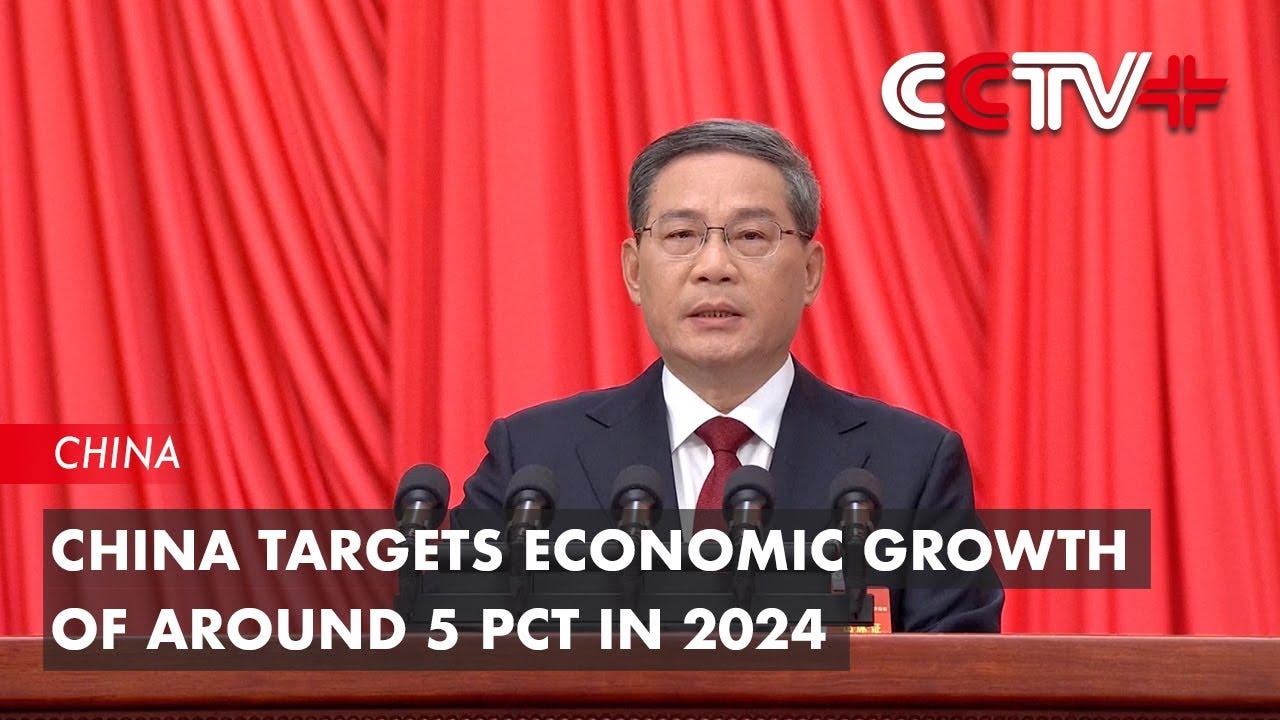What happened in China this week:
China’s Two Sessions Pledged to Stimulate Economy
JD.com’s Aggressive Price War Shows Result
Top Fashion Footwear Company Belle Fashion, refiles IPO
Bytedance Should Be Part of Magnificent 7
#1 China’s Two Sessions Pledged to Stimulate Economy
The annual “two sessions” parliamentary gathering in China this week. Premier Li Qiang mentioned that China will be setting its growth target at 5% this year similar to 2023. To achieve this target, he has shed light on some stimulative plans China has prepared for the year.
China prepares to issue ultra-long-term special treasury bonds for several consecutive years starting in 2024 to fuel growth through financing long term debt. The first issue will be 1 trillion yuan. Next, China will issue 3.9 trillion yuan in special government bonds to finance local government funding shortages. The government will be increasing focus on manufacturing, logistics and digital economy through increased technological education. In order to avoid oversupply, China will launch a year-long programme to boost domestic consumption.
Li also promised tax reforms, allowing wider access to private investors. They are also likely to remove the threshold for foreign investment in the manufacturing sector which will allow for more foreign funds to enter. This can increase fund flow into China and ultimately allow more international “smart money” to shore up China’s stock market. One important point in this meeting is that the government will offer more guarantees such as supply of subsidized housing to support the real estate market.
A sign of worry would be the mention of China’s increasing military budget by 7.2% to 1.67 trillion yuan. The geopolitical tension across borders has increased volatility and risk in the past year for the stock market. This creates uncertainty and could remain as a deterrence for foreign funds to come to China.
Next, Wu Qing, chief of China’s securities regulatory Commission has sternly warned again that any moves by institutions causing liquidity runs, investor panic will be heavily dealt with. This comes in the interest of individual investors which dominates the market. This seems like a move by China to help individuals transition their wealth into the stock market rather than continuing investing in real estate. This regulation would be a paradigm shift for the Chinese if it can result in an increase in retail investing. However, it will take a long term approach as habits are difficult to change and it is difficult to move into stocks when it's trending downwards.
In the meeting, China emphasized on its stimulative stance towards the macroeconomic environment and was also highly cautious to avoid creating economic bubbles from overcapacity. Xi coined the term “new productive forces” to suggest China’s pivotal focus towards hi-tech innovation for economic growth. As the exports for February rose 7.1% and imports rose 3.5% resulting in positive net export, these productive forces will be the fundamental focus of China to continue to drive growth amidst increasing protectionism. While the new productive forces were not specified, it likely focuses on the new three products, namely electric vehicles, lithium batteries and solar panels. The top businesses in these fields likely will receive large subsidies which will boost their global penetration.
Lastly, a senior Chinese diplomat has mentioned the need for China to stop “hiding its capacities and biding its time”. This offers an interesting thought that if China begins to promote itself, China will no longer be beaten down by western media. The businesses that have developed sufficiently overseas like Pinduoduo have done well amidst a falling Chinese market. If foreigners understand better about the on-the-ground economic situation, they will understand that the Chinese market is not as depressed as the media portrays.
Overall, it appears that China is willing to stimulate the economy, which is a good sign. Additionally, an economic growth target of 5% is higher than most estimates, which were around 4%. China's stocks have also responded positively thus far.




